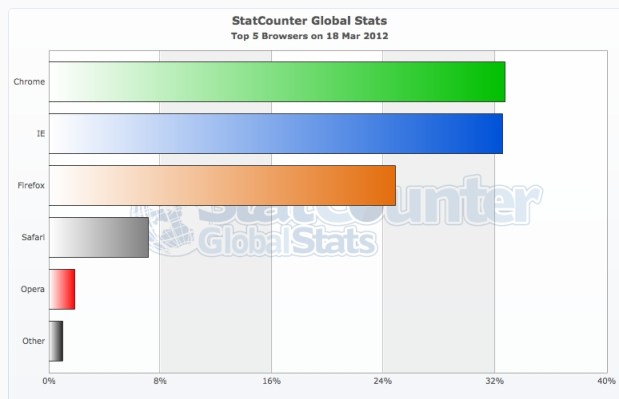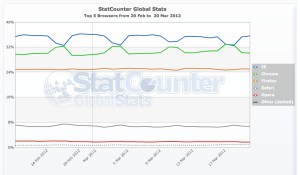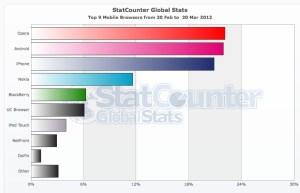Google has made some significant strides getting Chrome, in relatively short time, to become one of the most popular web browsers around. Now, some numbers from StatCounter indicate that it has, for the first time — and for one day only! — become the world’s most popular PC browser, overtaking Internet Explorer.
On March 18, Chrome just edged past Internet Explorer before Microsoft’s browser quickly regained its lead. What’s interesting is that Chrome’s ascendance was due to its popularity in India, Russia and Brazil, where it topped the polls, according to the analysts.
That is in contrast to markets like the U.S., China and Germany, where StatCounter says Google’s browser is regularly in second or third place, with Firefox and IE taking the top slot.
Two other notable trends emerge out of StatCounter’s data, which is based on 15 billion page views per month (4 billion in the U.S.), covering 3 million websites:
— Chrome’s rise is almost totally at the expense of Internet Explorer: as you can see in the graph below, usage of these two is almost the mirror opposite, while the other big players — Firefox, Safari and Opera — have relatively consistent usage.
— Chrome seems to be getting used more on weekends. That likely points to the fact that in office environments, IE continues to rule the roost, while when consumers are at home, they go for Google.
This points to Chrome possibly still finding it hard to make inroads into the enterprise, although if you subscribe to the theory of “consumerization” in IT, it’s just a matter of time before that tips to Google as a browser as well.
On the other hand, it also underscores how significant emerging markets have become in terms of swaying larger global use of internet products: something that will also increasingly get reflected in how they are developed.
Update: As these stats are PC-only, I wanted to add in a bit about what StatCounter says is the latest going on in mobile. Last month, the analyst group noted that Android had finally overtaken Opera as the world’s biggest mobile browser, but in fact numbers covering the last month up to today show them to be very close, with Opera just about edging out Android. In general, mobile looks like a more competitive state of play — or more fragemented, depending on how you see things.


